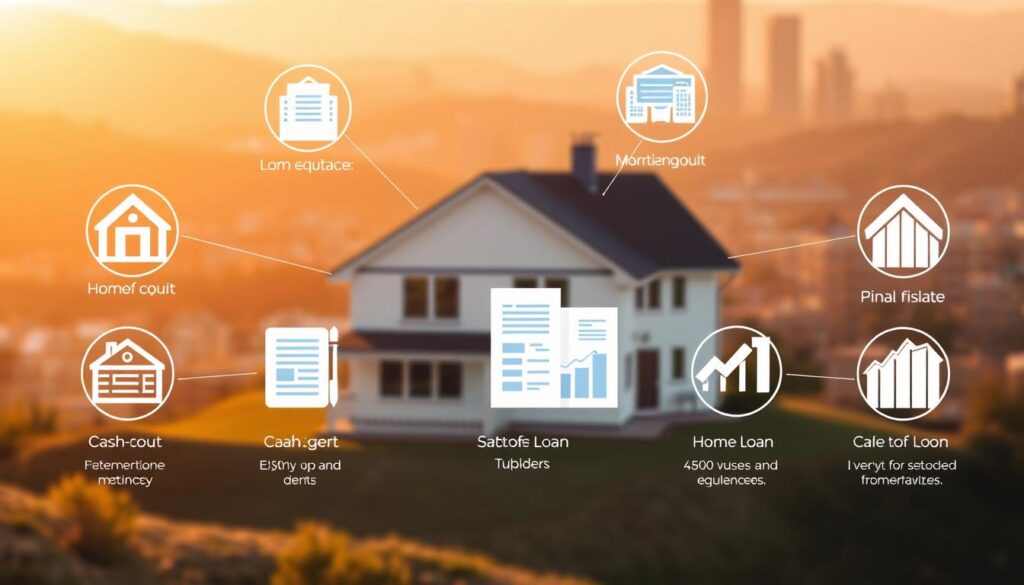Compare Top Home Equity Loan Rates for Your Needs
Did you know that current home equity loan rates are as low as 6.63% for a $50,000 loan, according to LendingTree? This attractive rate can significantly impact your financial decisions when considering a loan.
Exploring home financing means comparing rates is key. It helps you find the best deal for your needs. With many lenders offering different rates, knowing how to choose is important.
We’ll show you how to compare top home equity loan rates. By the end, you’ll know how to pick the right loan for your finances.
Key Takeaways
- Understand the current market rates for home equity loans.
- Learn how to compare rates from different lenders effectively.
- Identify factors that influence home equity loan rates.
- Discover tips for securing the best home equity loan rate.
- Explore how to use home equity loan rates to your financial advantage.
Understanding Home Equity Loans
For many homeowners, home equity loans can be a game-changer. They allow homeowners to borrow money using their home’s equity as collateral.
What is a Home Equity Loan?
A home equity loan gives homeowners a fixed amount of money upfront. This money is then repaid over a set period, usually with a fixed interest rate. This makes home equity loans different from other loans, like home equity lines of credit (HELOCs), which let you draw funds as needed.
Home equity loans are popular for their stability. The fixed interest rate and monthly payments help homeowners budget better.
Key Features of Home Equity Loans
Here are some key features of home equity loans:
- Fixed Interest Rates: Home equity loans usually have fixed interest rates. This means the interest rate stays the same for the whole loan term.
- Lump-Sum Payment: Homeowners get the loan amount in one payment. This money can be used for things like home improvements, paying off debt, or big purchases.
- Repayment Terms: The repayment term for home equity loans varies. But, they are usually repaid over a fixed period, lasting from 5 to 15 years or more.
Knowing these features helps homeowners decide if a home equity loan is right for them.
How Home Equity Loan Rates are Determined
Many factors influence home equity loan rates. These factors affect both lenders and borrowers. Knowing these can help you get a better rate.
Factors Influencing Interest Rates
Home equity loan rates are not random. They are based on important financial signs. Credit score, debt-to-income ratio, and loan-to-value ratio are key for lenders.
A good credit score can lower your rate. It shows you’re a reliable borrower. But, a high debt-to-income ratio might raise your rate. It means you might be borrowing too much.
The Role of Credit Score
Your credit score is very important for your rate. Lenders see high scores as a sign of safety. This means they might offer you better rates.
Keep your credit score high by paying on time and using credit wisely. Also, check your report for mistakes. This can help you get a better rate on your home equity loan.
Home Appraisal Impact
The value of your home affects your loan rate. A professional appraisal sets this value. A higher equity in your home can lead to better loan terms, like lower rates.
Lenders use appraisals to check your home’s value. They make sure the loan is not too big for your home. This is key for understanding the risk of lending to you.
Current Trends in Home Equity Loan Rates
Home equity loan rates have seen a recent shift. This change is due to national averages and regional differences. As of April 30, 2025, the average rate for a 5-year home equity loan is 8.36%, according to Bankrate. This rate is key to understanding the current home equity loan rates.
National Average Rates
The national average rate for home equity loans has been influenced by several factors. Currently, the average interest rate for home equity loans stands at around 8.36% for a 5-year term. This rate has gone up slightly from previous years. This increase is mainly due to the economic recovery and changes in monetary policy.
To better understand the trend, let’s examine the national average rates over the past few years:
| Year | Average 5-Year Home Equity Loan Rate |
|---|---|
| 2023 | 7.25% |
| 2024 | 7.95% |
| 2025 | 8.36% |
Regional Variations
While national averages give a general idea, regional variations are also important. Different regions face different economic conditions, affecting interest rates. For example, areas with high housing demand and limited supply may have higher interest rates due to competition.
Regional variations can be significant. For example, as of April 2025, the Northeast had an average home equity loan rate of 8.1%. The West Coast had a slightly higher rate of 8.4%. Knowing these regional differences is key for homeowners looking to use their home equity.
By looking at both national averages and regional variations, homeowners can make better decisions. They can ensure they get the best rates for their home equity loans.
Types of Home Equity Loan Products
Exploring the different types of home equity loans is key to using your home’s equity well. These loans vary to meet different financial needs and situations.
Fixed-Rate vs. Variable-Rate Loans
Home equity loans mainly come in fixed-rate and variable-rate types. Fixed-rate loans keep the interest rate the same for the loan’s life. This makes monthly payments predictable, helping with budgeting and planning.
Variable-rate loans, on the other hand, have rates that can change with the market. They might start with lower rates, but could go up, raising your payments. It’s important to consider the pros and cons of these rates.

Accessibility of Home Equity Lines of Credit
A Home Equity Line of Credit (HELOC) is another option for tapping into your home’s equity. Unlike a traditional loan, a HELOC lets you use the credit as needed, not all at once.
HELOCs are great for ongoing costs or projects with changing expenses, like home improvements. Here are some benefits:
- Flexibility in drawing funds as needed
- Potential for lower interest rates compared to credit cards
- Ability to reuse the credit line as you repay the borrowed amount
But, it’s crucial to use HELOCs wisely to avoid overspending or debt.
How to Calculate Home Equity
Home equity is a valuable asset for homeowners. Knowing how to calculate it is key for financial planning. To find your home equity, you need to know your home’s current value and the mortgage balance left.
Determining Your Home’s Current Value
To figure out your home equity, start by finding your home’s current market value. You can do this by:
- Checking recent sales of similar homes in your area
- Hiring a professional appraiser
- Using online real estate platforms for an estimate
We suggest talking to a real estate expert or using online tools for a better estimate. Knowing your home’s current value is key to calculating your equity.
Understanding Loan-to-Value Ratio
The loan-to-value (LTV) ratio is important for figuring out how much equity you can borrow against. It’s found by dividing your mortgage balance by your home’s value. For example, if you owe $150,000 and your home is worth $250,000, your LTV ratio is 60%.
To see how LTV ratios work, look at the table below:
| Outstanding Mortgage Balance | Home’s Current Value | LTV Ratio |
|---|---|---|
| $120,000 | $200,000 | 60% |
| $180,000 | $300,000 | 60% |
| $80,000 | $200,000 | 40% |
The LTV ratio shows lenders the risk of lending against your home’s equity. For more on calculating home equity and its impact, check out this resource.
Understanding how to calculate your home equity and the LTV ratio helps you make better decisions. You can use your home’s value to secure loans or lines of credit.
Benefits of Home Equity Loans
Home equity loans offer many benefits, like financial flexibility and lower interest rates. They provide homeowners with a big source of funds. These funds can be used for different needs.
Potential Uses of Funds
Home equity loans are a flexible financial tool. Homeowners can use them for:
- Home renovations or repairs
- Consolidating high-interest debt
- Funding major expenses, such as education or medical bills
- Covering unexpected costs
This flexibility makes home equity loans a great choice for those needing a lot of money.
Lower Interest Rates Compared to Personal Loans
Home equity loans have lower interest rates than other loans, like personal loans or credit cards. This is because they are secured by the home. So, homeowners get better rates, making these loans cheaper to use.
Risks of Home Equity Loans
Home equity loans can be a blessing and a curse. They let homeowners use their property’s value for money, like for home fixes or paying off debts. But, it’s vital to know the downsides.
Impact on Home Ownership
One big risk is losing your home. If you can’t pay back the loan, you might face foreclosure. This is a serious threat. Always check your finances before getting a home equity loan.
Experts say knowing your loan terms and having a repayment plan are crucial. Bankrate advises, “Homeowners should think carefully about their finances and risks before getting a home equity loan.”
Borrowing Responsibly
It’s key to borrow wisely with home equity loans. This means not taking on more debt than needed and having a steady income for payments. Here are some tips:
- Only borrow what you need to avoid unnecessary debt.
- Make sure you have a stable income to support your loan repayments.
- Consider consulting with a financial advisor to determine the best course of action for your situation.
By being aware of these risks and borrowing wisely, homeowners can make smart choices about home equity loans. It’s also wise to look at other options and review loan terms carefully.
In summary, home equity loans can be helpful but carry big risks, like losing your home. Understanding these risks and borrowing carefully can help homeowners use these loans safely.
How to Compare Home Equity Loan Rates
To choose the right home equity loan, we must compare rates from different lenders. Finding the best rate is key. It’s about comparing what each lender offers.
Looking for the lowest rate is important. But, we also need to understand the loan terms. This helps us make a smart choice.
Shopping Around for Quotes
Getting quotes from various lenders is essential. We should talk to banks, credit unions, and online lenders. This way, we get a range of offers.
- Check with local banks and credit unions for competitive rates.
- Explore online lenders that specialize in home equity loans.
- Consider consulting a mortgage broker who can provide access to multiple lenders.

Using Online Tools for Comparisons
Online tools can also help us compare loans. They let us see different offers side by side. This makes it easier to choose.
Key features to compare include:
- Interest rates: Fixed vs. variable rates.
- Fees: Origination fees, closing costs, and annual fees.
- Repayment terms: Loan duration and monthly payment amounts.
By using these strategies, we can find a home equity loan that fits our needs. It’s all about making an informed choice.
Tips for Securing the Best Home Equity Loan Rates
Getting the best home equity loan rates requires improving your financial health and choosing the right time to apply. Homeowners need to work on their credit and plan their loan application carefully. This way, they can get the best terms possible.
Improving Your Credit Score
Your credit score plays a big role in getting a good loan rate. Lenders see high scores as a sign of reliability, which can lead to better loan terms. To boost your score, focus on:
- Paying bills on time to show you’re reliable
- Lowering your debt to improve your debt-to-income ratio
- Minimizing new credit checks to avoid score drops
By following these steps, you can make your credit profile more attractive to lenders.
Timing Your Application
The timing of your loan application also matters a lot. Interest rates and the housing market can change, affecting what lenders offer. Think about:
- Watching interest rates to apply when they’re low
- Understanding the housing market’s impact on your home’s value
- Applying when your finances are at their strongest, like after paying down debt
To see how different factors affect loan rates, look at this comparison:
| Credit Score Range | Average Interest Rate | Loan Terms |
|---|---|---|
| 750-850 | 4.5% | Favorable terms, lower fees |
| 700-749 | 5.0% | Standard terms, moderate fees |
| 650-699 | 5.5% | Less favorable terms, higher fees |
This table shows how important a good credit score is for better loan rates.
By improving your credit score and timing your application wisely, you can greatly improve your chances of getting the best home equity loan rates.
Frequently Asked Questions
When we talk about home equity loans, many questions come up. Knowing the answers can make the process clearer and show the benefits of using your home’s equity.
Tax Implications
Many worry about the tax side of home equity loans. In the U.S., you might be able to deduct the interest paid. This can lower your taxable income. But, it’s key to talk to a tax expert to see how it affects you. Tax laws can shift, so it’s important to stay updated.
Loan Process Timeline
The time it takes for a home equity loan can differ. It depends on the lender and how complex your application is. The steps include applying, getting an appraisal, and getting approved. It usually takes weeks to months to finish.
By answering these common questions, we aim to clear up the home equity loan process. We want to help you understand it better, so you can make smart financial choices.









